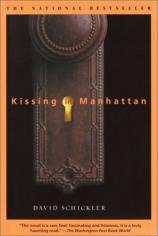Kissing in Manhattan
Review
Kissing in Manhattan
A smart feminist seduced by a beefy, muscle car driving chauvinist
named Checkers. A devoted wife who bathes her timid husband
nightly. A headstrong Princeton-bound high school girl bent on
marrying her English teacher. A failed comedian who earns celebrity
status as an angry mouse in a stage play. Hulking men's men whose
demands on life fall far outside today's nice guy standards.
These quirky, ironic, darkly romantic and sexy characters' lives
are weaved in and around first time author Schickler's cryptic and
mysterious Preemption apartment building in Manhattan. Schickler
burst onto the literary scene in summer 2000 with publication of
his short story "The Smoker" in The New Yorker. As
characters from "The Smoker" step in and out of the other ten
fascinating tales in this "novel in stories," haunting imagery and
themes long forgotten begin to emerge.
Schickler employs darkness, mythology, Middle Ages mysticism,
medieval rites of passage and bestiality to portray a modern New
York full of profoundly lonely thirtysomethings finding love and
redemption in the oddest of circumstances. The centerpieces of this
eclectic set are "Duty," and "Telling it All to Otis," where
Patrick Rigg, a 33-year-old New York stockbroker, has a score to
settle with the world. His inner scars run deep over the absurd
childhood death of his older brother, Francis, at Guppy The Wonder
Fish's theme park. Armed and dangerous, Rigg unleashes some of his
tension by psychologically seducing and dominating a growing and
devoted harem of young women, making them fall in love with their
own bodies.
Rigg's Preemption apartment roommate is James Branch, an introvert
accountant who falls head over heels for travel writer Rally
McWilliams, who, post-Rigg romance, remains one of the distant yet
hopeful Rigg devotees. Introduced in "Kissing in Manhattan," Rally
wants what most of Schickler's smart yet unfulfilled heroines
hunger for --- "sometimes only gentle contact, a brushing of her
lips on the stranger's cheek. Other times she wanted violent, total
commiseration." What Rally finds, to her growing delight, is James,
who pours his heart out to Otis in the Preemption's otherworldly
elevator, a habit he has had since childhood when he sat for hours
in his parents' dumbwaiter, hiding from a world that almost
couldn't cure his speech impediment.
Meanwhile, St. Agnes High School advanced placement English teacher
Douglas Kerchek finds himself the object of standout student Nicole
Bonner's forceful affections in "The Smoker." Invited to dine with
Nicole and her parents in their Preemption penthouse, the reserved
and proper Kerchek is shocked to discover his pairing is wholly
endorsed by the Bonners. Again, the story is awash in dark
imageries as Samson Bonner reveals his lineage of royalty from the
Carpathian Mountains --- Dracula's hometown.
In still another Preemption apartment, jingle writer Jacob Wolf,
who never lived up to his Hemingwayesque father's expectations, is
bathed methodically and nightly by his wife Rachel.
Rigg brings most of the characters together for the Millennial
Solstice Debauchery Spree, a ten-day bacchanal celebration
headquartered in the Preemption, plans that soon threaten to
destroy four lives. The fates urge St. Benedict's Father Thomas
Merchant to the Preemption the night the looming building's odd
peace is to be shattered. Rigg discovers Rally's love for James and
her subsequent deflection from the harem and he decides that the
gun he carries must challenge all of life's absurdities by killing
James Branch. The expertly scripted encounter between Rigg and
Father Merchant is one of biblical proportions with the gun as
Satan and Merchant as the defiant grace of God.
While "kissing in Manhattan" is a mixed metaphor for vanity that
leads to loneliness, and brooding shyness that yields greater
rewards, the novel is overpopulated by raw sexuality, fantasies
involving bondage, domination, beast-men and lucky charms as
Schickler slyly references nearly thirty mythological characters
and locals, and actively unites humans and animals. He brilliantly
builds bridges between the new and old world, while stomping
today's political correctness with primal dreams, desires and
urges. The startling and surprising conclusion to this charming and
endearing set of stories is evidence of the quiet power of an
author just beginning to challenge the politically-correct
establishment.
Reviewed by Brandon M. Stickney on January 22, 2011
Kissing in Manhattan
- Publication Date: August 27, 2002
- Genres: Short Stories
- Paperback: 274 pages
- Publisher: Dial Press Trade Paperback
- ISBN-10: 0385335679
- ISBN-13: 9780385335676




